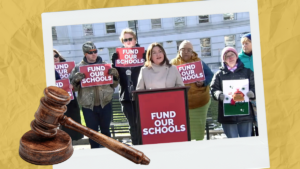Source: EdNC
Recently, WRAL published an article detailing the views of two extremists running for office in North Carolina: Mark Robinson, the Republican candidate for governor, and Michele Morrow, the Republican candidate for superintendent of public instruction, regarding federal education funding. This has sparked curiosity about whether Robinson or Morrow might encourage state lawmakers to reject federal funds if elected.
The article highlights Robinson’s comments:
“If I had my way,” Robinson said, “I’d refuse the check. I don’t want your money. It comes with too many unwanted obligations. We don’t need it.”
He added, “There shouldn’t be a federal department of education, period.”
Similarly, Morrow expressed concern over the strings attached to federal funding:
“People need to understand that with every dollar from the federal government comes an expectation to push their agenda,” Morrow said. She added, “We don’t need your money; we’ll handle it as a state.”
How much federal money is involved? Quite a bit. According to the N.C. Department of Public Instruction’s annual budget report, the state receives $1.10 billion in federal funding, excluding funds for child nutrition and COVID relief.
The funding from the federal government pays for vital programs in schools, including:
- $688 million supported lower-income students and the schools that serve them.
- $531 million went to school nutrition programs.
- $380 million served students with special needs.
- $43 million supported career and technical education.
- $33 million funded other programs, including substance abuse and mental health care.
For 2025, the U.S. Department of Education estimates North Carolina will receive $1.2 billion for elementary and secondary education alone, with another $713 million from the U.S. Department of Agriculture for child nutrition. Federal aid is especially crucial for states facing unexpected expenses, such as the COVID-19 pandemic, during which North Carolina received $6.3 billion in federal relief.
In addition to the Department of Public Instruction, other entities in the state, such as Duke University, Village of Wisdom, and Appalachian State University, benefit from federal grants for various educational programs.
These calls to eliminate the Department of Education and decline federal funding are not new at all. For years, Republicans have floated such proposals, often driven by concerns over bureaucratic inefficiency, overspending, and federal overreach. Former President Donald Trump has called for the elimination of the Department of Education since his election in 2016, and it is a fundamental component of his Project 2025 plan.
Project 2025, a conservative initiative, and the 2024 GOP platform both advocate for eliminating the Department of Education and completely privatizing education. Project 2025 also suggests converting federal funds into block grants or cutting them altogether and removing any program related to LGBTQ+ youth or diversity, which would have profound and devastating consequences for civil rights, school funding, students’ progress, and the fate of public schools.
In North Carolina, rejecting federal funding could have significant consequences for local school districts. A recent analysis by the N.C. Justice Center estimated the state could lose $1.7 billion in federal revenue for education. The cuts would disproportionately affect districts serving high-need students, reducing resources such as teachers, support staff, and mental health professionals.





